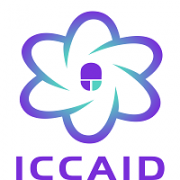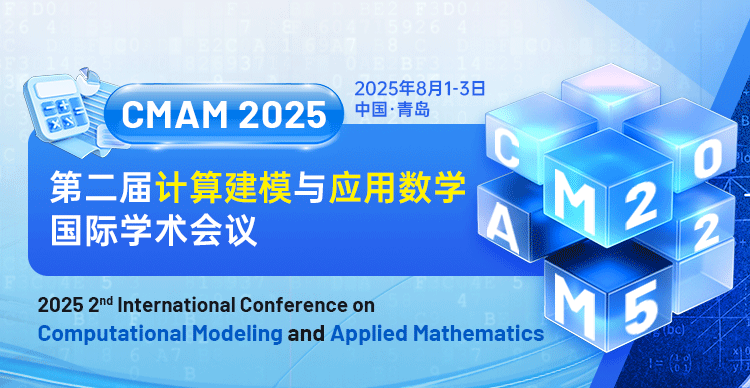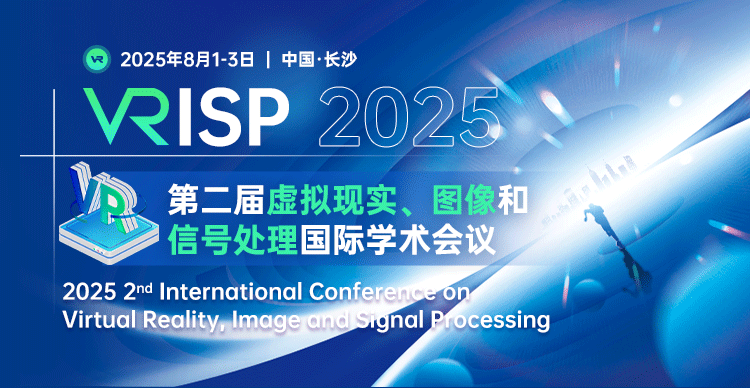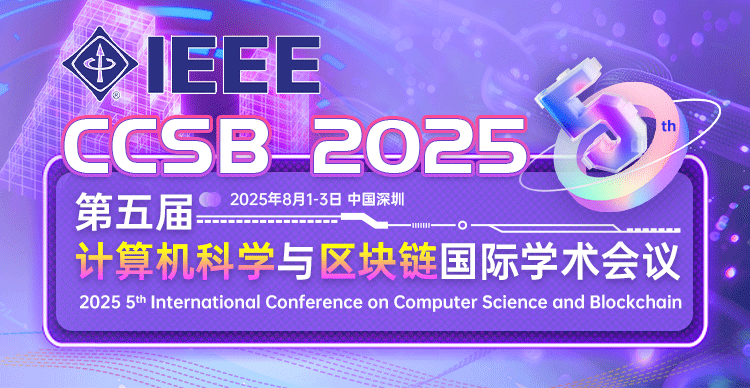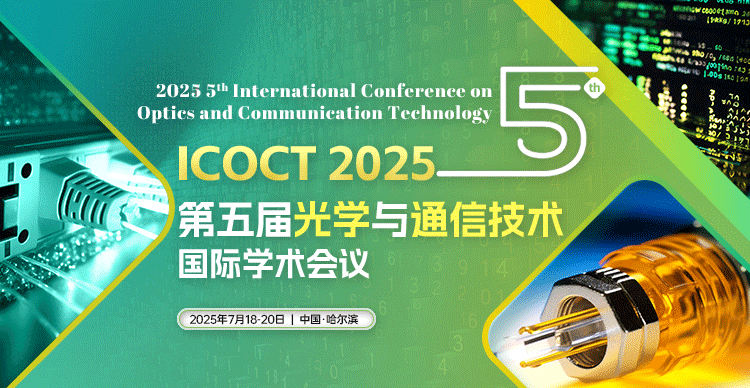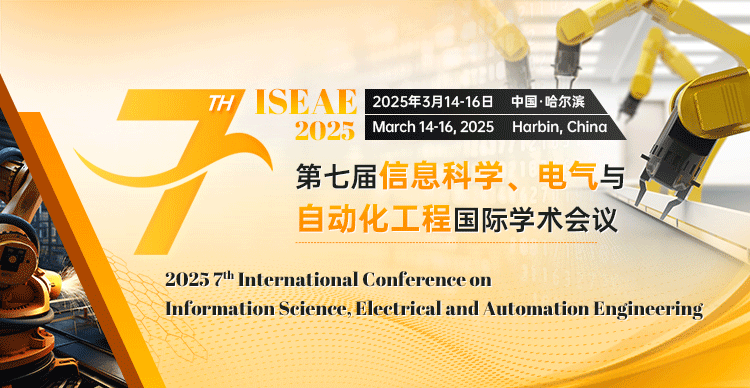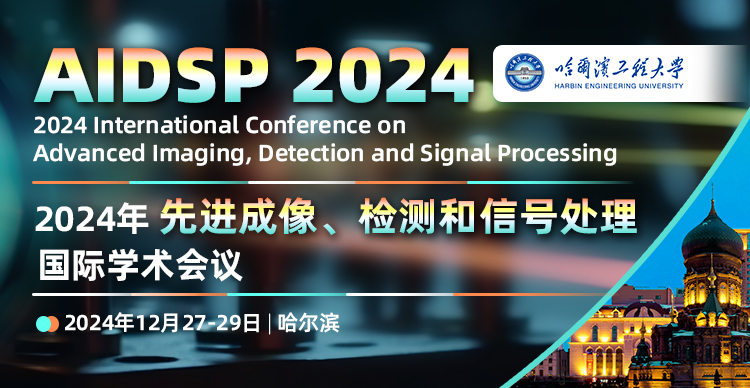第四届计算机图形学、人工智能与数据处理国际学术会议
2024 4th International Conference on Computer Graphics Artificial Intelligence and Data Processing (ICCAID 2024)
大会简介
第四届计算机图形学、人工智能与数据处理国际学术会议(ICCAID 2024)将于 2024年11月29日-12月1日在中国哈尔滨举行。本次会议主要围绕“计算机图形学、人工智能与数据处理”的最新研究展开,旨在荟聚世界各地该领域的专家、学者、研究人员及相关从业人员,分享研究成果,探索热点问题,交流新的经验和技术。我们热烈欢迎相关领域专家学者向ICCAID 2024提交他们的新研究或技术贡献,与来自世界各地的科学家和学者分享宝贵的经验!
主讲嘉宾(持续邀约中)
何祥健 教授,宁波诺丁汉大学
何教授在斯坦福大学 2022 年报告的“世界前 2% 科学家”名单中。2011年至2022年,他是悉尼科技大学(UTS)全球大数据技术中心(GBDTC)的计算机科学教授和计算机视觉和模式识别实验室的负责人。他是IEEE信号处理协会学生委员会成员。他参与了2018年获得UTS校长通过合作卓越研究奖的团队。他被国际技术研究所(ITI)授予“国际注册技术专家”称号。他带领悉尼科技大学和香港理工大学(理大)联合研究项目团队获得2017年VIP杯亚军,以及IEEE信号处理学会颁发的2019年VIP杯冠军。2021年,由理大林教授领衔、新加坡科技大学何教授领衔的理大团队再次夺得2021年贵宾杯亚军。
过去几年,他主要在计算机视觉、数据分析和机器学习领域进行研究。他最近带领他的研究团队进行基于深度学习的研究,包括人类行为识别、人类计数和密度估计、微小物体检测、生物医学应用、显著性检测、自然语言处理、网络安全、人脸和人脸表情识别、路标检测、车牌识别等。
雷涛 教授,陕西科技大学
雷涛,三级教授、博士生导师、校学术委员会委员、电子信息与人工智能学院副院长CCF/CSIG/IEEE高级会员;担任中国图象图形学学会视觉传感专委会委员,中国体视学学会图像分析分会委员,陕西省图象图形学学会常务理事,第16届神经计算、模糊系统与知识发现ICNC-FSKD2020国际会议大会共同主席,多个国际会议组委会主席、宣传主席、奖励委员会主席等,人工智能顶级会议AAAI2020-2024、IJCAI2019-2024程序委员会委员,Frontiers in Signal Processing副编辑,Remote Sensing及《无线电工程》编委,《智能系统学报》助理编委,IEEE J-STARS客座编辑。
2011年在西北工业大学获信息与通信工程博士学位,2014-2024年先后5次赴澳大利亚悉尼科技大学、伦敦布鲁内尔大学、日本爱知县立大学进行访学研究(合作导师分别为澳大利亚科学院院士、英国皇家工程院院士等),先后在西北工业大学电子科学与技术、计算机科学与技术博士后流动站从事研究工作,两站均获优秀博士后称号;先后于2012年晋升为副教授,2016年晋升为教授,2017年入选陕西省高层次人计划,2021年获陕西省杰出青年基金,2022年入选Wiley威力中国开放科学高贡献作者,2023年入选斯坦福全球前2%顶尖科学家。
主要研究方向为人工智能、计算机视觉、机器学习等;目前已在国内外权威刊物及会议IEEE TIP、IEEE TMI、IEEE TFS、IEEE TGRS、IJCAI等发表学术论文80余篇,其中6篇论文入选ESI高被引论文;主持国家自然科学基金(5项)、陕西省杰出青年基金、陕西省重点研发计划、中国博士后科学基金(特别资助、面上资助)等项目;以第一完成人获陕西省科学技术二等奖1项,甘肃省高等学校科研优秀成果一等奖1项,2018年获IEEE第13届人脸及姿态识别国际会议(FG2018,CCF推荐会议)-手势识别项目赛道亚军;指导的研究生中已有5人获得国家励志奖学金,指导学生获第七届中国国际“互联网+”大学生创新创业大赛研究生创意组国家级铜奖、第十八届中国研究生电子设计竞赛全国总决赛一等奖(优秀指导教师)。
征稿主题
计算机图形学
人工智能
数据处理
图形学基础理论与算法
真实感图形
几何造型与处理
计算机动画与游戏
非真实感图形
基于图像和视频的图形技术
计算机辅助几何设计
计算机辅助设计
虚拟现实技术及应用
混合现实技术及应用
科学计算可视化
图像视频处理与数字媒体技术
计算机仿真
人机交互技术
工程图形及应用
三维视觉
图形用户界面
生物特征
模式识别
机器视觉
专家系统
深度学习
智能搜索
自动编程
智能控制
智能机器人
语言与图像理解
遗传程序设计
自然语言处理
计算机视觉与机器人
自适应系统
智能代理
智能控制
神经网络与支持向量机
模糊集合论
模糊控制与系统
知识管理
基于知识的智能系统
视觉信息处理
人工智能工具与应用
数据挖掘
大数据技术与应用
大数据管理与应用
大数据运维
数学与应用科学
信息与计算科学
统计学
计算机科学
数据科学与大数据技术
信息科学
控制科学
系统科学
物联网
计算机控制技术
工业网络技术
信息安全
出版信息
会议投稿经过2-3位组委会专家严格审核后,最终所录用的论文将被SPIE - The International Society for Optical Engineering (ISSN: 0277-786X)出版,并提交至EI Compendex, Scopus检索。
【会议出版检索历史】(往届均见刊检索)
2021年出版SPIE - The International Society for Optical Engineering,已完成EI、SCOPUS检索
2022年出版SPIE - The International Society for Optical Engineering,已完成EI、SCOPUS检索
2023年出版SPIE - The International Society for Optical Engineering,已完成EI、SCOPUS检索
投稿说明
1.论文投稿需要提交WORD与PDF格式文件,且不得少于4页。
2.投稿只接收全英文投稿,如需翻译服务,请联系会议秘书,投稿前请相关作者仔细检查文章格式,需以会议论文集模板为准。
3.已录用论文请及时注册,逾期注册,默认放弃发表。
4.论文应具有学术或实用价值,且从未在国内外任何期刊或会议发表过。作者可通过CrossCheck, iThenticate(查重率低于30%)或其他查重系统自费查重。由文章重复率引起的出版社拒搞,作者需自行承担责任。确认学术造假的论文将不被出版,且公布在会议主页。
About ICCAID 2024
2024 4th International Conference on Computer Graphics, Artificial Intelligence and Data Processing
2024 4th International Conference on Computer Graphics, Artificial Intelligence and Data Processing (ICCAID 2024) will be held on November 29-December 1, 2024 in Harbin, China. This conference focuses on the latest research on "Computer Graphics, Artificial Intelligence and Data Processing", aiming to gather experts, scholars, researchers and related practitioners in this field from all over the world, share research results, explore hot issues and exchange new experiences and technologies. We warmly welcome experts and scholars in related fields to submit their new research or technical contributions to ICCAID 2024, and share valuable experiences with scientists and scholars from all over the world.
CALL FOR PAPERS
hot.gif The topics of interest include, but are not limited to:
Computer Graphics
· Basic theory and algorithms of graphics
· Realistic graphics
· Geometric Modeling and Processing
· Computer animation and games
· Non-realistic graphics
· Graphics technology based on image and video
· Computer-aided geometric design
· Computer-aided design
· Virtual Reality Technology and Applications
· Mixed Reality Technology and Applications
· Scientific computing visualization
· Image Video Processing and
· Digital Media Technology
· Computer Simulation
· Human-Computer Interaction Technology
· Engineering Graphics and Applications
· Three-dimensional vision
· Graphical User Interface
Artificial Intelligence
· Biometrics
· Pattern Recognition
· Machine Vision
· Expert Systems
· Deep Learning
· Intelligent Search
· Automatic Programming
· Intelligent Control
· Intelligent Robotics
· Language and Image Understanding
· Genetic Programming
· Natural Language Processing
· Computer Vision and Robotics
· Adaptive Systems
· Intelligent Agents
· Neural networks and support
· vector machines
· Fuzzy Set Theory
· Fuzzy Control and Systems
· Knowledge Management
· Knowledge-based Intelligent Systems
· Visual Information Processing
· Artificial Intelligence Tools and
· Applications
Data Processing
· Data Mining
· Big Data Technology and Applications
· Big Data Management and Applications
· Big Data Operations and Maintenance
· Mathematics and Applied Science
· Information and Computational Science Statistics
· Computer Science
· Data Science and Big Data Technology
· Information Science
· Control Science
· Systems Science
· Internet of Things
· Computer Control Technology
· Industrial Network Technology
· Information Security
IMPORTANT DATES
Full Paper Submission Date September 15, 2024
Registration Deadline October 02, 2024
Final Paper Submission Date October 25, 2024
Conference Dates November 29-December 1, 2024
Publication
All papers, both invited and contributed, will be reviewed by two or three experts from the committees. After a careful reviewing process, all accepted papers of ICCAID 2024 will be published and will be submitted to EI Compendex / Scopus for indexing.
ICCAID 2022: Cover丨EI Compendex丨Scopus
ICCAID 2021: Cover丨EI Compendex丨Scopus
Note: All submitted articles should report original results, experimental or theoretical, not previously published or being under consideration for publication elsewhere. Articles submitted to the conference should meet these criteria. We firmly believe that ethical conduct is the most essential virtue of any academic. Hence, any act of plagiarism or other misconduct is totally unacceptable and cannot be tolerated.

